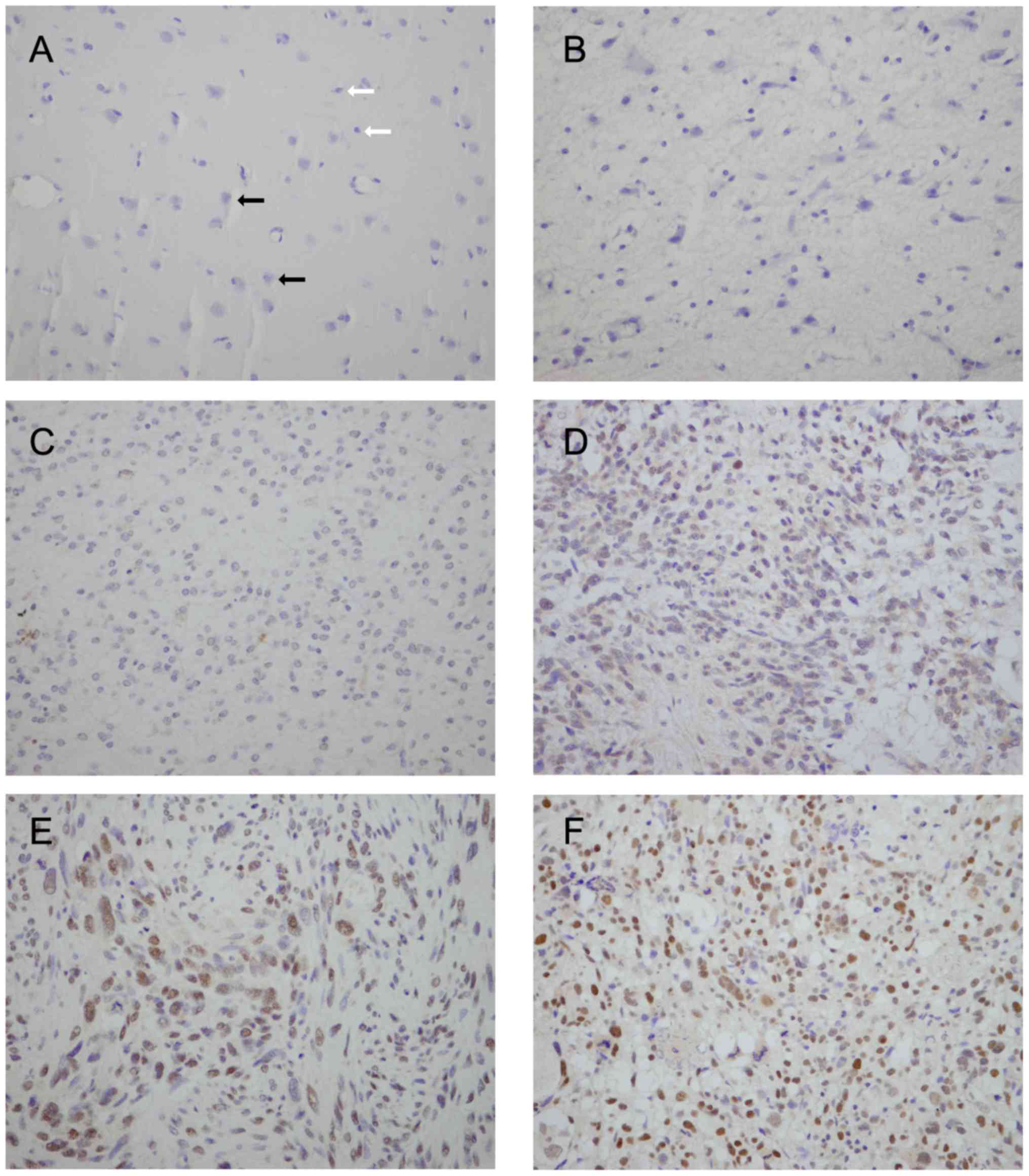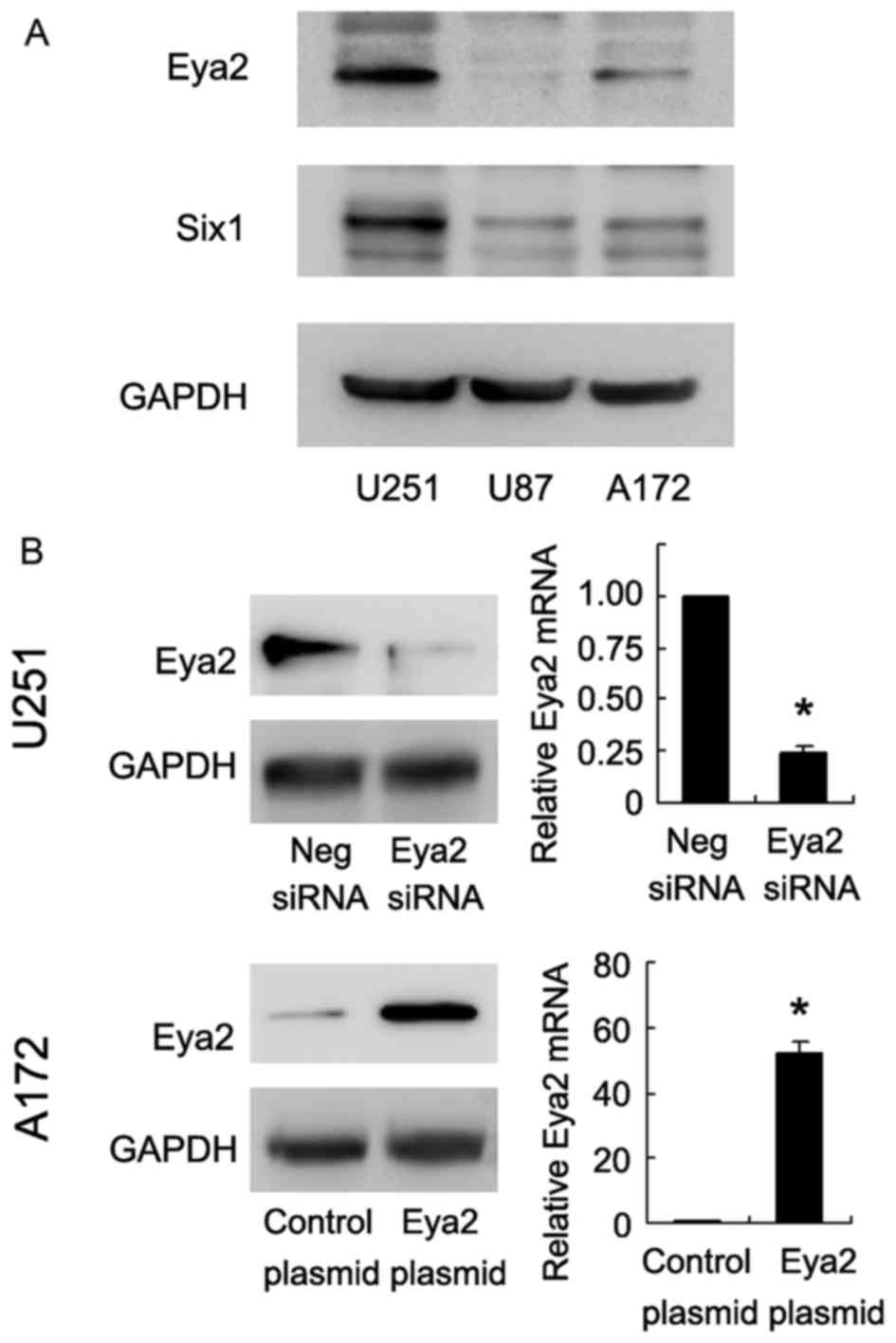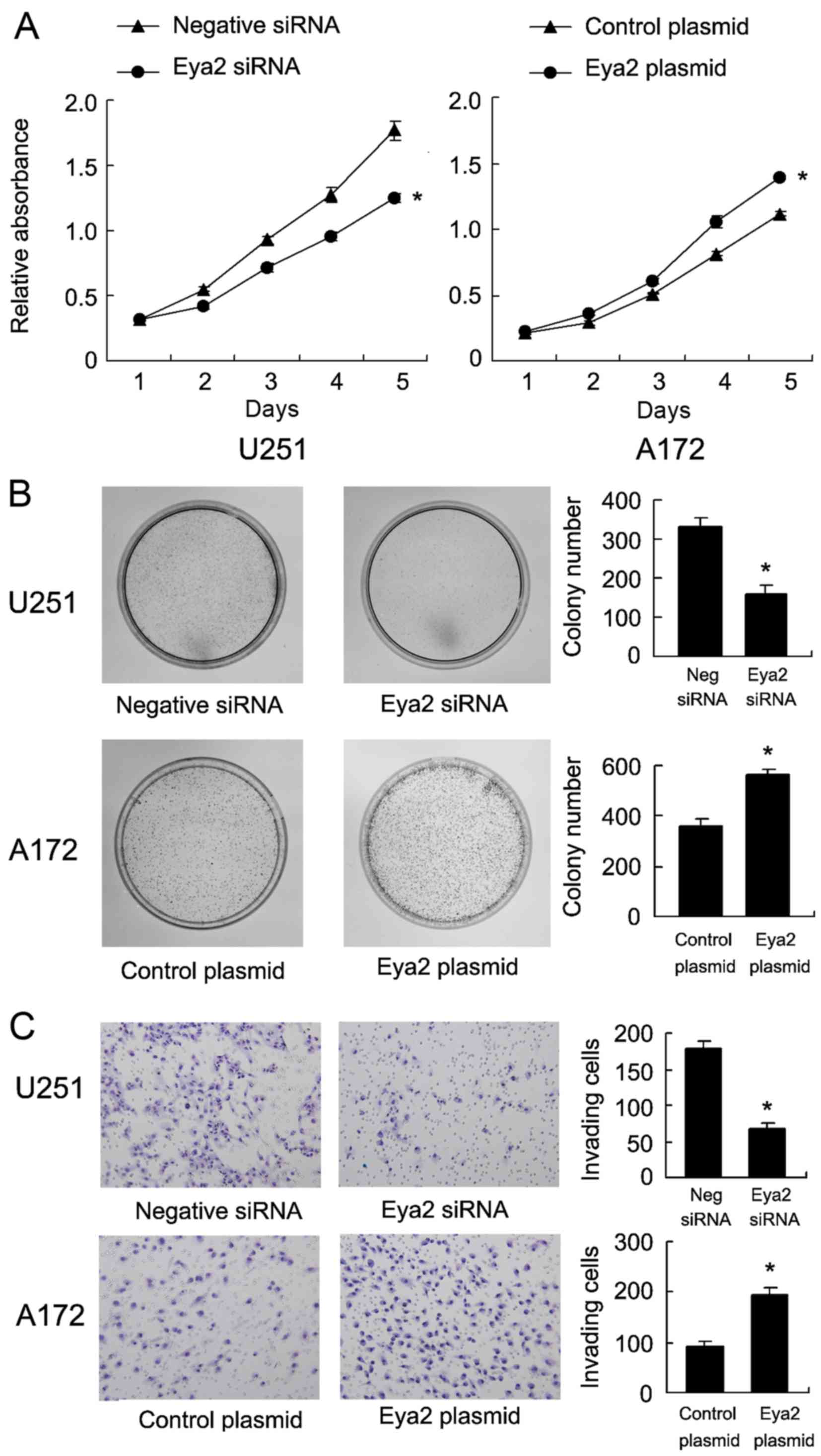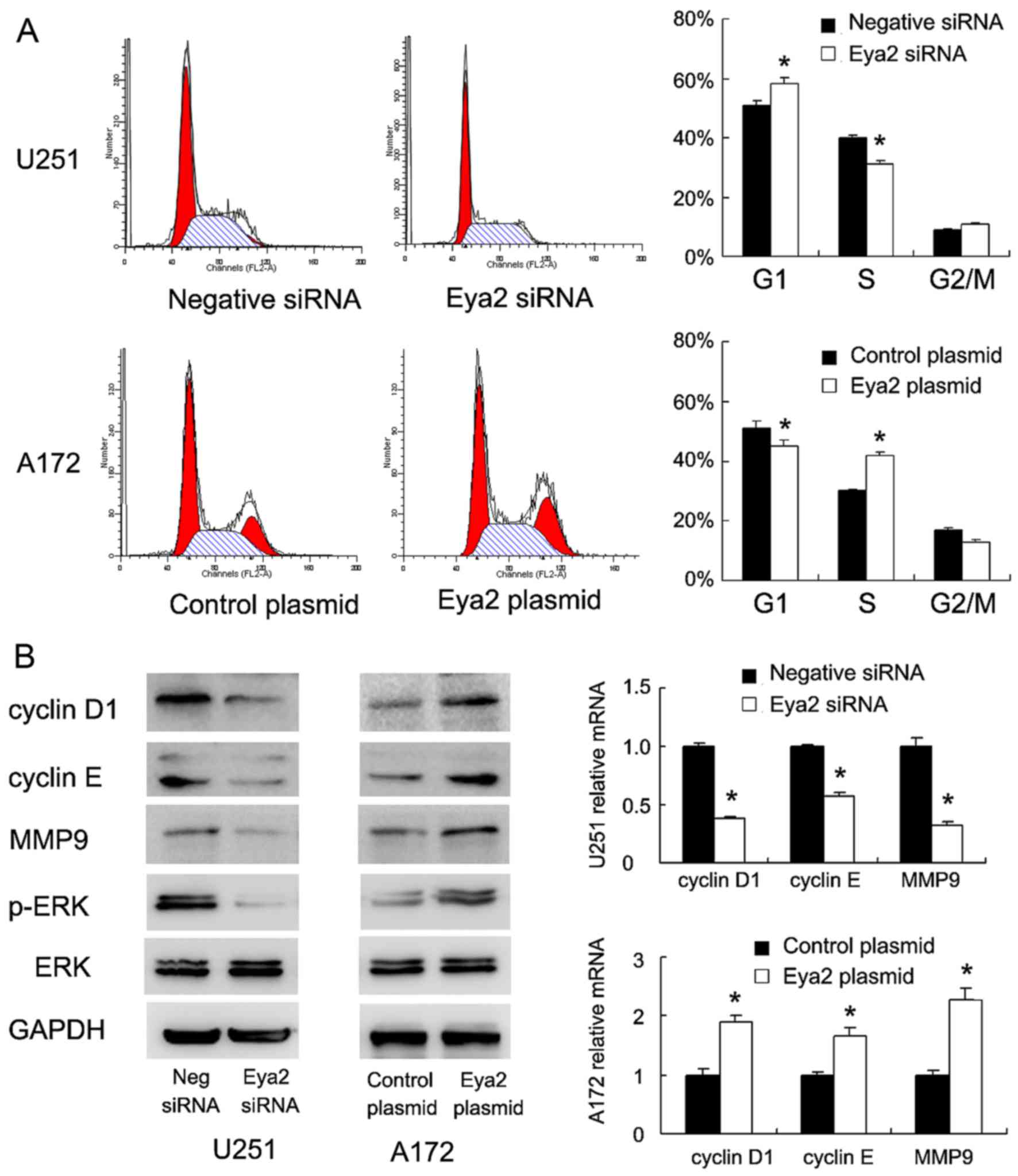|
1
|
Siegel R, Naishadham D and Jemal A: Cancer
statistics, 2012. CA Cancer J Clin. 62:10–29. 2012. View Article : Google Scholar : PubMed/NCBI
|
|
2
|
Krupkova O Jr, Loja T, Redova M, Neradil
J, Zitterbart K, Sterba J and Veselska R: Analysis of nuclear
nestin localization in cell lines derived from neurogenic tumors.
Tumour Biol. 32:631–639. 2011. View Article : Google Scholar : PubMed/NCBI
|
|
3
|
Zadran S, Amighi A, Otiniano E, Wong K and
Zadran H: ENTPD5-mediated modulation of ATP results in altered
metabolism and decreased survival in gliomablastoma multiforme.
Tumour Biol. 33:2411–2421. 2012. View Article : Google Scholar : PubMed/NCBI
|
|
4
|
Chi F, Wu R, Jin X, Jiang M and Zhu X:
HER2 induces cell proliferation and invasion of non-small-cell lung
cancer by upregulating COX-2 expression via MEK/ERK signaling
pathway. Onco Targets Ther. 9:2709–2716. 2016.PubMed/NCBI
|
|
5
|
Jiang Q, Pan Y, Cheng Y and Li H, Liu D
and Li H: Lunasin suppresses the migration and invasion of breast
cancer cells by inhibiting matrix metalloproteinase-2/-9 via the
FAK/Akt/ERK and NF-κB signaling pathways. Oncol Rep. 36:253–262.
2016. View Article : Google Scholar : PubMed/NCBI
|
|
6
|
Ko HS, Park BJ, Choi SK, Kang HK, Kim A,
Kim HS, Park IY and Shin JC: STAT3 and ERK signaling pathways are
implicated in the invasion activity by oncostatin M through
induction of matrix metalloproteinases 2 and 9. Yonsei Med J.
57:761–768. 2016. View Article : Google Scholar : PubMed/NCBI
|
|
7
|
Dong DD, Zhou H and Li G: ADAM15 targets
MMP9 activity to promote lung cancer cell invasion. Oncol Rep.
34:2451–2460. 2015. View Article : Google Scholar : PubMed/NCBI
|
|
8
|
Kalhori V and Törnquist K: MMP2 and MMP9
participate in S1P-induced invasion of follicular ML-1 thyroid
cancer cells. Mol Cell Endocrinol. 404:113–122. 2015. View Article : Google Scholar : PubMed/NCBI
|
|
9
|
Jacob A, Jing J, Lee J, Schedin P, Gilbert
SM, Peden AA, Junutula JR and Prekeris R: Rab40b regulates
trafficking of MMP2 and MMP9 during invadopodia formation and
invasion of breast cancer cells. J Cell Sci. 126:4647–4658. 2013.
View Article : Google Scholar : PubMed/NCBI
|
|
10
|
Silver SJ, Davies EL, Doyon L and Rebay I:
Functional dissection of eyes absent reveals new modes of
regulation within the retinal determination gene network. Mol Cell
Biol. 23:5989–5999. 2003. View Article : Google Scholar : PubMed/NCBI
|
|
11
|
Kumar JP and Moses K: EGF receptor and
Notch signaling act upstream of Eyeless/Pax6 to control eye
specification. Cell. 104:687–697. 2001. View Article : Google Scholar : PubMed/NCBI
|
|
12
|
Kenyon KL, Ranade SS, Curtiss J, Mlodzik M
and Pignoni F: Coordinating proliferation and tissue specification
to promote regional identity in the Drosophila head. Dev Cell.
5:403–414. 2003. View Article : Google Scholar : PubMed/NCBI
|
|
13
|
Krishnan N, Jeong DG, Jung SK, Ryu SE,
Xiao A, Allis CD, Kim SJ and Tonks NK: Dephosphorylation of the
C-terminal tyrosyl residue of the DNA damage-related histone H2A.X
is mediated by the protein phosphatase eyes absent. J Biol Chem.
284:16066–16070. 2009. View Article : Google Scholar : PubMed/NCBI
|
|
14
|
Farabaugh SM, Micalizzi DS, Jedlicka P,
Zhao R and Ford HL: Eya2 is required to mediate the pro-metastatic
functions of Six1 via the induction of TGF-β signaling,
epithelial-mesenchymal transition, and cancer stem cell properties.
Oncogene. 31:552–562. 2012.
|
|
15
|
Zhang L, Yang N, Huang J, Buckanovich RJ,
Liang S, Barchetti A, Vezzani C, O'Brien-Jenkins A, Wang J, Ward
MR, et al: Transcriptional coactivator Drosophila eyes absent
homologue 2 is up-regulated in epithelial ovarian cancer and
promotes tumor growth. Cancer Res. 65:925–932. 2005.PubMed/NCBI
|
|
16
|
Bierkens M, Krijgsman O, Wilting SM, Bosch
L, Jaspers A, Meijer GA, Meijer CJ, Snijders PJ, Ylstra B and
Steenbergen RD: Focal aberrations indicate EYA2 and hsa-miR-375 as
oncogene and tumor suppressor in cervical carcinogenesis. Genes
Chromosomes Cancer. 52:56–68. 2013. View Article : Google Scholar
|
|
17
|
Bai G, Chu J, Eli M, Bao Y and Wen H:
PAQR3 overexpression suppresses the aggressive phenotype of
esophageal squamous cell carcinoma cells via inhibition of ERK
signaling. Biomed Pharmacother. 94:813–819. 2017. View Article : Google Scholar : PubMed/NCBI
|
|
18
|
Li J, Chen S and Ni B: Upregulation of
HINT2 inhibits non-small cell lung cancer cell invasion via
COX-2/PGE2-mediated activation of β-catenin signaling. Oncol Res.
Aug 11–2017.Epub ahead of print. View Article : Google Scholar
|
|
19
|
Song J, Guan Z, Li M, Sha S, Song C, Gao Z
and Zhao Y: MicroRNA-154 inhibits the growth and invasion of
gastric cancer cells by targeting DIXDC1/WNT signaling. Oncol Res.
Aug 11–2017.Epub ahead of print.
|
|
20
|
Liao Y, Yuan S, Chen X, Zhu P, Li J, Qin L
and Liao W: Up-regulation of BRCA1-associated RING domain 1
promotes hepatocellular carcinoma progression by targeting Akt
signaling. Sci Rep. 7:76492017. View Article : Google Scholar : PubMed/NCBI
|
|
21
|
Jin H, Xie Q, Guo X, Xu J, Wang A, Li J,
Zhu J, Wu XR, Huang H and Huang C: p63α protein upregulates heat
shock protein 70 expression via E2F1 transcription factor 1,
promoting Wasf3/Wave3/MMP9 signaling and bladder cancer invasion. J
Biol Chem. Aug 9–2017.Epub ahead of print. View Article : Google Scholar
|
|
22
|
Patrick AN, Cabrera JH, Smith AL, Chen XS,
Ford HL and Zhao R: Structure-function analyses of the human
SIX1-EYA2 complex reveal insights into metastasis and BOR syndrome.
Nat Struct Mol Biol. 20:447–453. 2013. View Article : Google Scholar : PubMed/NCBI
|
|
23
|
Fu J, Xu X, Kang L, Zhou L, Wang S, Lu J,
Cheng L, Fan Z, Yuan B, Tian P, et al: miR-30a suppresses breast
cancer cell proliferation and migration by targeting Eya2. Biochem
Biophys Res Commun. 445:314–319. 2014. View Article : Google Scholar : PubMed/NCBI
|
|
24
|
Abdullah JM, Ahmad F, Ahmad KA, Ghazali
MM, Jaafar H, Ideris A, Ali AM, Omar AR, Yusoff K, Lila MA, et al:
Molecular genetic analysis of BAX and cyclin D1 genes in patients
with malignant glioma. Neurol Res. 29:239–242. 2007. View Article : Google Scholar : PubMed/NCBI
|
|
25
|
Arato-Ohshima T1 and Sawa H:
Over-expression of cyclin D1 induces glioma invasion by increasing
matrix metalloproteinase activity and cell motility. Int J Cancer.
83:387–392. 1999. View Article : Google Scholar : PubMed/NCBI
|
|
26
|
Velpula KK, Rehman AA, Chelluboina B,
Dasari VR, Gondi CS, Rao JS and Veeravalli KK: Glioma stem cell
invasion through regulation of the interconnected ERK, integrin α6
and N-cadherin signaling pathway. Cell Signal. 24:2076–2084. 2012.
View Article : Google Scholar : PubMed/NCBI
|
|
27
|
Das G, Shiras A, Shanmuganandam K and
Shastry P: Rictor regulates MMP-9 activity and invasion through
Raf-1-MEK-ERK signaling pathway in glioma cells. Mol Carcinog.
50:412–423. 2011. View
Article : Google Scholar : PubMed/NCBI
|
|
28
|
Lakka SS, Jasti SL, Gondi C, Boyd D,
Chandrasekar N, Dinh DH, Olivero WC, Gujrati M and Rao JS:
Downregulation of MMP-9 in ERK-mutated stable transfectants
inhibits glioma invasion in vitro. Oncogene. 21:5601–5608. 2002.
View Article : Google Scholar : PubMed/NCBI
|
|
29
|
Blevins MA, Towers CG, Patrick AN, Zhao R
and Ford HL: The SIX1-EYA transcriptional complex as a therapeutic
target in cancer. Expert Opin Ther Targets. 19:213–225. 2015.
View Article : Google Scholar : PubMed/NCBI
|
|
30
|
Li Z, Tian T, Lv F, Chang Y, Wang X, Zhang
L, Li X, Li L, Ma W, Wu J, et al: Six1 promotes proliferation of
pancreatic cancer cells via upregulation of cyclin D1 expression.
PLoS One. 8:e592032013. View Article : Google Scholar : PubMed/NCBI
|
|
31
|
Ono H, Imoto I, Kozaki K, Tsuda H, Matsui
T, Kurasawa Y, Muramatsu T, Sugihara K and Inazawa J: SIX1 promotes
epithelial-mesenchymal transition in colorectal cancer through ZEB1
activation. Oncogene. 31:4923–4934. 2012. View Article : Google Scholar : PubMed/NCBI
|
|
32
|
Tian T, Li A, Lu H, Luo R, Zhang M and Li
Z: Six1 promotes glioblastoma cell proliferation and invasion by
upregulation of connective tissue growth factor. Am J Cancer Res.
5:1823–1830. 2015.PubMed/NCBI
|
|
33
|
Iwanaga R, Wang CA, Micalizzi DS, Harrell
JC, Jedlicka P, Sartorius CA, Kabos P, Farabaugh SM, Bradford AP
and Ford HL: Expression of Six1 in luminal breast cancers predicts
poor prognosis and promotes increases in tumor initiating cells by
activation of extracellular signal-regulated kinase and
transforming growth factor-beta signaling pathways. Breast Cancer
Res. 14:R1002012. View
Article : Google Scholar : PubMed/NCBI
|
|
34
|
Coletta RD, Christensen K, Reichenberger
KJ, Lamb J, Micomonaco D, Huang L, Wolf DM, Müller-Tidow C, Golub
TR, Kawakami K, et al: The Six1 homeoprotein stimulates
tumorigenesis by reactivation of cyclin A1. Proc Natl Acad Sci USA.
101:6478–6483. 2004. View Article : Google Scholar : PubMed/NCBI
|



















